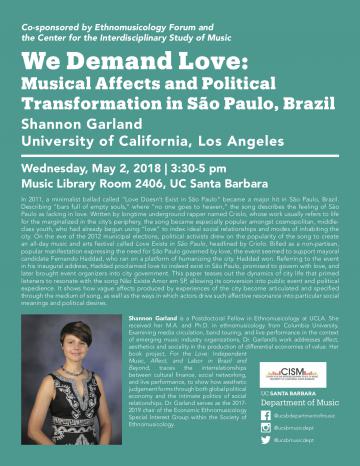Event Date:
Event Location:
- Music Library 2406
Date: May 2, 2018
3:30-5PM
Location: Music Library 2406
In 2011, a minimalist ballad called "Love Doesn’t Exist in São Paulo" became a major hit in São Paulo, Brazil. Describing “bars full of empty souls,” where “no one goes to heaven,” the song describes the feeling of São Paulo as lacking in love. Written by longtime underground rapper named Criolo, whose work usually refers to life for the marginalized in the city’s periphery, the song became especially popular amongst cosmopolitan, middle-class youth, who had already begun using “love” to index ideal social relationships and modes of inhabiting the city. On the eve of the 2012 municipal elections, political activists drew on the popularity of the song to create an all-day music and arts festival called Love Exists in São Paulo, headlined by Criolo. Billed as a non-partisan, popular manifestation expressing the need for São Paulo governed by love, the event seemed to support mayoral candidate Fernando Haddad, who ran on a platform of humanizing the city. Haddad won. Referring to the event in his inaugural address, Haddad proclaimed love to indeed exist in São Paulo, promised to govern with love, and later brought event organizers into city government. This paper teases out the dynamics of city life that primed listeners to resonate with the song Não Existe Amor em SP, allowing its conversion into public event and political expedience. It shows how vague affects produced by experiences of the city become articulated and specified through the medium of song, as well as the ways in which actors drive such affective resonance into particular social meanings and political desires.
Shannon Garland is a Postdoctoral Fellow in Ethnomusicology at UCLA. She received her M.A. and Ph.D. in ethnomusicology from Columbia University. Examining media circulation, band touring, and live performance in the context of emerging music industry organizations, Dr. Garland's work addresses affect, aesthetics and sociality in the production of differential economies of value. Her book project, For the Love: Independent Music, Affect, and Labor in Brazil and Beyond, traces the interrelationships between cultural finance, social networking, and live performance, to show how aesthetic judgement forms through both global political economy and the intimate politics of social relationships. Dr. Garland serves as the 2017-2019 chair of the Economic Ethnomusicology Special Interest Group within the Society of Ethnomusicology.
Co-sponsored by Ethnomusicology Forum and the Center for the Interdisciplinary Study of Music.

